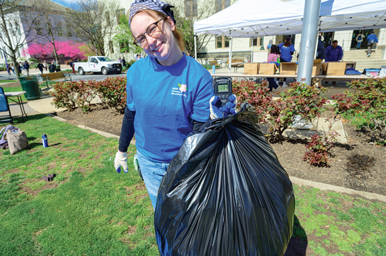
It’s a dirty job—but Eagles are eager to do it.
During Campus Beautification Day on April 8 staffers from the Zero Waste Office and student volunteers sorted by hand 315 pounds of trash, recyclables, and compostables collected over 24 hours from the first and third floors of the Mary Graydon Student Center to assess how accurately the AU community is sorting its waste.
Eighty-seven percent of the waste, much of it food scraps and other organic material, had been tossed in the trash—but the team determined that, in fact, only 20 percent needed to be sent to landfills. The bulk of the waste—68 percent—was compostable, while 13 percent was recyclable.
“The biggest takeaway is that a huge amount of compost is being thrown away in MGSC,” says Caroline Boone, zero waste manager. People are well-intended, she says, but “often you walk up to a bin, and you don’t think about it.”
“Because MGSC is such a large, single-point source of waste, figuring out how we can get that waste sorted more effectively has the potential to have a very large impact,” Boone says.
The average American generates nearly five pounds of waste each day, according to 2024 data from the Environmental Protection Agency. Diverting as much of that as possible from landfills benefits people and the planet alike. Composting organic waste cuts greenhouse gas emissions, reduces the need for pesticides, conserves water, and returns essential nutrients back to the soil.
AU—which is committed to achieving zero waste by 2030—currently diverts 41 percent of waste from landfills, up from 30 percent in 2023. AU also composted 153 tons of food in 2024, an increase of 340 percent from the previous year.
“We remain committed to thinking deeply about our environmental impact and doing the hard work to ensure we’re being responsible about campus waste,” says Bronté Burleigh-Jones, Kogod/BS ’91, MBA ’93, CFO, vice president, and treasurer. “I am proud of how efforts by the Facilities Management Zero Waste Office—and the entire AU community—have resulted in steady, incremental progress toward achieving our ambitious campus sustainability goals.”
Coach Marsha Harper and members of the women’s soccer team were among those who volunteered during the April waste audit. Harper says she’ll think twice next time she tosses what’s left of her falafel from Halal Shack, her favorite MGSC eatery.
“Campus is our home, and, collectively, Earth is our home, so we have to make sure we’re taking care of it,” she says. “It’s no different than keeping our locker room clean. We have to keep an eye on the bigger good.”
Spreading Mulch—and Community
Despite a biting windchill, the feeling on the quad was warm and welcoming for AU’s 32nd annual Campus Beautification Day April 8.
“We are so grateful to all of you,” President Jon Alger said to volunteers who planted lilac, daisies, and a handful of trees. “One of the reasons why I came to AU is this beautiful campus [and a community] that cares about our natural environment.”
Dioni Gonzalez, assistant director of membership services and promotion in Recreational Sports and Fitness, was among the green thumbs who lent a helping hand, planting catmint and coronation gold yarrow in the garden between Bender Library and the McKinley Building.
“It’s fun to give back to the campus that gives to us every day,” said Joey Nihill, competitive sports and facility coordinator.
Later in the day, Lilian Baeza-Mendoza, Hurst senior professorial lecturer in the Department of World Languages and Cultures, and psychology professor Brian Yates were named the Green Teachers of the Year by the AU’s Center for Teaching, Research, and Learning.
The two are the only professors who have been certified by the green teaching program every year since its inception in 2008. To date, 1,000 professors have earned the credential, reaching about 300,000 students who have taken certified green courses.
Robert Corletta of the DC Department of Transportation’s Urban Forestry Division also presented Alger with AU’s 16th Tree Campus USA designation.
“I hope you know how special your campus is,” Corletta said.